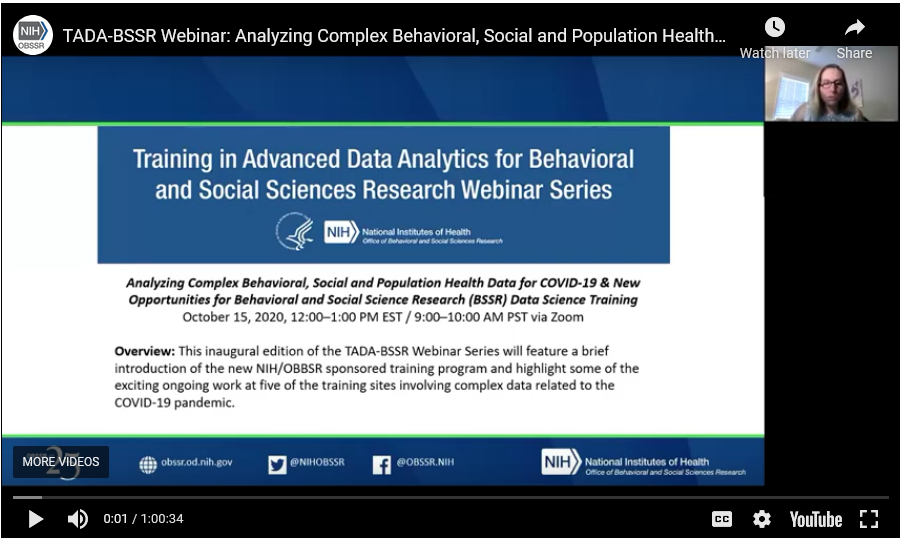The Office of Behavioral and Social Sciences Research (OBSSR) has identified training needs in several areas relevant to the behavioral and social sciences.
Good Clinical Practice for Social and Behavioral Research eLearning Course
In 2016, NIH issued a policy establishing an expectation that all NIH-funded investigators and staff involved in conducting, overseeing, or managing clinical trials should be trained in Good Clinical Practice (GCP) and should refresh their training at least every three years. The principles of GCP ensure the safety, integrity, and quality of clinical trials. GCP provides a standard for compliance, implementation, data collection, monitoring, and reporting, and outlines the responsibilities of Institutional Review Boards (IRBs), investigators, sponsors, and monitors. In 2024, course material was updated to provide additional training on regulatory changes and reporting requirements, enhanced accessibility features, and a new module on community and stakeholder engagement.
Accessing the Training Modules
The course materials are free to access and use. There are several ways to access the training:
- NIH-Funded Researchers (extramural): Access the course on the Society of Behavioral Medicine’s website.
- Educational Institutions: Download the materials for your institution’s LMS on the OBSSR website.
TADA-BSSR Webinar: Integrating Data Analytics into the Social and Behavioral Science Research Lifecycle
Presenters: Hannah L. F. Cooper, Sc.D., Rollins School of Public Health, Emory University; Lance Waller, Ph.D., Rollins School of Public Health, Emory University
May 20, 2021 | Video Recording | Webinar Description: The presenters explore the ways that elements of Cook and Campbell’s validity framework can strengthen analyses of “big data” that are designed to study, monitor, and intervene in drug-related harms. They also discuss the relevance of specific threats to internal validity, external validity, and statistical conclusion validity to these analyses, and strategies to minimize these threats.
TADA BSSR Webinar: Translating Domain Knowledge into Mechanistic Process Models
Presenters: Eric Hekler, University of California San Diego; Misha Pavel, Northeastern University; Donna Spruijt-Metz, University of Southern California
March 18, 2021 | Video Recording | Webinar Description: Translating Domain Knowledge into Mechanistic Process Models: Illustrating the Need with a Just-in-Time Adaptive Intervention
TADA-BSSR Webinar: Analyzing Complex Behavioral, Social and Population Health Data for COVID-19
Presenter: Carl T. Bergstrom, Ph.D., University of Washington
January 21, 2021 | Video Recording | Webinar Description: Selection bias occurs when the way a statistical sample is obtained prevents the sample from accurately representing the population about which one wishes to draw inferences. Straightforward as the issue may seem, selection bias is among the most pernicious perils of statistical inference. This lecture discusses some of the many ways that selection bias and related phenomena, from right censoring to the Will Rogers effect, can arise in medical research and beyond. It draws upon a range examples, including recent studies on COVID-19.
TADA-BSSR Webinar: Analyzing Complex Behavioral, Social, and Population Health Data for COVID-19 and New Opportunities for BSSR Data Science Training
Presenters: Lorene Nelson, Ph.D., M.S., Stanford University School of Medicine; Lance Waller, Ph.D., Emory University; Mick Tilford, Ph.D., University of Arkansas for Medical Sciences; Lucila Ohno-Machado, M.D., Ph.D., University of California, San Diego; and Maria Glymour, Sc.D., M.S., University of California, San Francisco
October 15, 2020 | Video Recording | Webinar Description: This video is a recording of the inaugural edition of the TADA-BSSR Webinar Series which features a brief introduction of the new NIH/OBBSR sponsored training program and highlights some of the exciting ongoing work at five of the training sites involving complex data related to the COVID-19 pandemic.

OBSSR Methodology Seminar: Text Mining for Behavioral and Social Sciences Research
August 9, 2019 | NIH Videocast Archive | Seminar Description: The age of Big Data has ushered in a wave of high-volume digital information and much of it is text based. Text mining is a form of data mining that involves collecting and analyzing large volumes of textual data to reveal patterns and relationships. Techniques for mining can be used to extract key concepts, spot trends, summarize content from documents and gain semantic understanding, and index and search text for use in predictive analytics. Text mining has become an important research process with many different commercial and academic applications, and it is becoming more widely applied in social science studies. This one-day methodology seminar sponsored by OBSSR presented a basic introductory overview of principles and techniques of text mining for behavioral and social research and showcased some innovative health research examples.
OBSSR Methodology Seminar: Predictive Modeling for Behavioral and Social Sciences Health Research
October 12, 2018 | NIH Videocast Archive | Seminar Description: This one-day methodology seminar showcased principles and techniques for prediction modeling from machine learning via specific case examples presented by scientists who are applying predictive algorithms to health-related behavioral and social sciences data.
OBSSR Methodology Workshop: Emerging Nontraditional Survey Data Collections
August 25, 2017 | NIH Videocast Archive | Seminar Description: Surveys via in-person interviews, telephone interviews, and mail questionnaires have been a traditional mainstay in the behavioral and social sciences for many decades. Vast technological and societal changes are driving inevitable change in the world of health research data collection. The past decade has seen an extraordinary expansion in the range of new technologies being applied in survey research. This seminar focused on health research involving emerging, nontraditional survey methodologies, including online non-probability panel surveys; survey participant recruitment via social media platforms; opportunities for using text messaging or SMS to recruit and engage survey participants for health research; “passive data collection” obtained from mobile devices or “sensor devices”; and the value of social media or web data in the context of health survey research.








